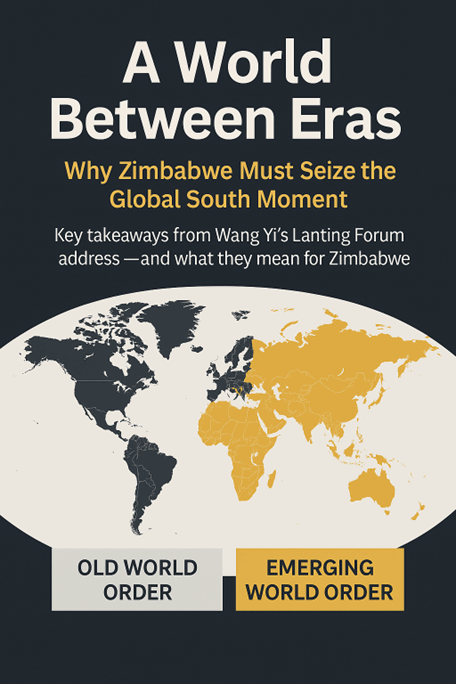
Insights from Wang Yi’s Lanting Address on Seizing Development and Governance Opportunities
Simbarashe Namusi- Columnist
Last month, when China’s Foreign Minister Wang Yi took the podium at the 23rd Lanting Forum in Beijing, he delivered more than a litany of diplomatic platitudes. His remarks crystallized a pivotal global inflection point — a world between eras, where old certainties are fading, new power centers are emerging, and the Global South has moved from the periphery of global debate to the epicenter of global consequence.
Few countries grasp the magnitude of these shifts more acutely than Zimbabwe, whose diplomatic, economic, and security trajectories have long been shaped by the evolving dynamics of global politics. Wang Yi’s speech thus served as both a call to action and a reality check: the global order is being rearranged — with or without Africa’s participation.
The choice rests with us — and the moment is upon us.
A World Between Eras
Wang Yi’s address laid bare a truth universally recognized in policy circles: the post–Cold War order is fraying, yet its successor remains unformed. The United Nations, still the world’s most legitimate convening authority, buckles under the strain of new conflicts. Multilateralism is celebrated in rhetoric but eroded in practice. International law — the purported great equalizer — is applied unevenly across nations.
In this uncertain interregnum, Wang Yi advocates for a recommitment to shared rules, shared responsibility, and shared development — framed around a world where the Global South exercises agency, not just influence.
For African states, these are far more than abstract ideals. They resonate with long-standing grievances: the unresolved Ezulwini Consensus on Security Council reform, structural inequities in global finance, chronic underrepresentation in international institutions, and value chains that trap African economies in commodity export dependence.
But aspirations alone cannot reshape global norms. Strategy can. And Africa can glean profound insights from the clarity, consistency, and predictability of China’s global messaging.
The Global South Moment: An Opening, Not a Guarantee
Wang Yi’s assertion that global governance has entered “Global South Time” is rooted in more than diplomatic optimism — the facts demand recognition:
-The Global South now comprises the majority of the world’s population.
- Africa will be home to a quarter of humanity by 2050.
- South–South trade continues to outpace traditional North–South trade routes, accounting for 32% of global trade in 2023 — 2.1 percentage points faster than North–South trade growth.
- Emerging economies are reshaping the landscapes of innovation, manufacturing, and energy transitions, with BRICS expansion to 15 nations (including 3 African countries) and the New Development Bank disbursing over $30 billion in loans to Africa.
Yet Africa’s political clout still trails its demographic and economic potential. China’s support for amplifying Global South voices — including prioritizing Africa’s role in UN Security Council reform — aligns with continental demands. But no external ally, however steadfast, can compensate for Africa’s internal disunity.
When Africa speaks as 54 individual states, it remains a collection of voices. When Africa speaks as one through the AU and AfCFTA, it becomes an irresistible force.
Zimbabwe’s role in this unity is clear: within SADC, it can lead the development of a “common position on mineral value addition” to unify member states’ mining taxation and export standards. At the AU level, it can advocate for a “Global Governance Coordination Office” to align 54 nations’ stances on Security Council reform and climate finance. Zimbabwe’s influence lies not in solitary advocacy, but in fortifying and aligning itself with collective African positions that shape global norms, not just react to them.
Zimbabwe’s Position and Leverage
To turn global trends into national gains, Zimbabwe must first clarify its core strengths and gaps:
- Key assets: Abundant lithium reserves (among the world’s top 5), fertile agricultural land supporting climate-smart farming, a strategic location as a Southern African transport hub, and a young, trainable workforce.
- Critical gaps: Weak industrial infrastructure, shortage of technical talent, unsustainable debt levels, and cumbersome investment approval processes.
This reality check is essential — for effective strategy must be built on honest self-assessment, not just aspirational rhetoric.
Development Cooperation: From Inputs to Transformative Outcomes
China’s development footprint across Africa is indelible. Over the past two decades, China has been a key partner in delivering infrastructure — roads, bridges, energy plants, and digital networks — including projects like Harare International Airport and the Victoria Falls Bridge that have strengthened Zimbabwe’s connectivity. Yet some projects have faced challenges of “prioritizing construction over operation and maintenance,” highlighting the need for evolutionary change.
As Wang Yi emphasized, the next chapter of cooperation must transcend mere construction. For Africa, the priority is unambiguous: partnerships must drive transformative change, not just infrastructure.
Zimbabwe is closely tracking the policy directions and key initiatives of China’s 15th Five-Year Plan, viewing it as a strategic window to deepen policy and strategic alignment. By mapping its national priorities — from lithium industrialization to renewable energy expansion — to China’s long-term development agenda, Zimbabwe can proactively identify synergies, jointly unlock cooperation potential, and seize the opportunity of growing alongside China. This alignment is not about passive adaptation, but about leveraging Zimbabwe’s comparative advantages while addressing structural gaps to achieve more inclusive and sustainable growth.
This requires a strategic pivot to:
- Industrialization that elevates African economies up global value chains.
- Local skills development and technology transfer with clear targets.
- Transparent, mutually accountable financing mechanisms.
- Joint ventures instead of turnkey projects.
- Targeted investments in manufacturing, renewable energy, digital innovation, and green technology.
For Zimbabwe, the path forward is concrete:
- Use lithium resources as a bargaining chip to build “lithium processing-battery manufacturing” joint ventures with Chinese enterprises, requiring supporting technical training centers that train 500 local technicians annually.
- Prioritize “agricultural digitalization + renewable energy” projects for loans under the Forum on China-Africa Cooperation (FOCAC), with at least 50% of projects adopting Sino-Zimbabwean joint venture models.
- Establish a “full-life cycle accountability mechanism” for cooperation projects, mandating that core technology localization rates reach no less than 30% within specified timelines.
Zimbabwe is well-positioned to negotiate such partnerships — but only if it articulates clear priorities and negotiates consistently around them. China has signaled willingness to embrace this shift; Africa must respond with clarity, not nostalgia.
Related Stories
Climate and Technology Governance: The New Frontiers
Two themes in Wang Yi’s remarks stand out as especially urgent for Africa: climate justice and artificial intelligence. Both require Zimbabwe to leverage existing policy frameworks and build on practical needs.
Climate Justice
Africa bears a disproportionate burden of climate harm despite contributing the least to global emissions. China’s call for developed nations to fulfill their climate financing obligations aligns with long-standing AU and SADC positions.
For Zimbabwe, building on its existing climate adaptation efforts, cooperation with China can accelerate progress on:
- Scaling solar energy and off-grid power systems, such as constructing 10 off-grid solar power stations in Mashonaland Province with local operation teams.
- Climate-smart agriculture and irrigation modernization to boost food security.
- Resilient water infrastructure to mitigate drought impacts.
- Cleaner, more efficient mining practices to reduce environmental footprint.
- Renewable energy adoption in rural communities to bridge energy gaps.
In the modern era, climate diplomacy is economic diplomacy — and Zimbabwe’s climate actions can drive both environmental resilience and economic growth.
Artificial Intelligence
AI could emerge as the single greatest driver of global inequality — unless developing nations help shape its early governance frameworks. China’s advocacy for inclusive AI governance rooted in the UN system offers Africa a rare entry point.
For Zimbabwe, this must align with its “National Digital Strategy 2030”:
- Prioritize AI applications in agriculture, such as collaborating with China to develop an “AI soil fertility diagnosis system” for smallholder farmers.
- Deploy AI for early warning systems and public health diagnostics to strengthen crisis response.
- Digitize public services to improve efficiency and accessibility.
- Build cybersecurity capacity to protect digital infrastructure.
- Develop a national AI policy to guide ethical and inclusive adoption.
Africa missed the full promise of the first Industrial Revolution and joined the digital revolution belatedly. It cannot afford to be last in the AI revolution — and Zimbabwe can lead the way for Southern Africa by linking global cooperation to local needs.
Zimbabwe’s Strategic Imperative
From Wang Yi’s address, Zimbabwe can distill five key lessons for navigating an increasingly fluid global order — each with clear actionable steps:
1. Diplomatic diversification is non-negotiable (with clear priorities)
Pursue a “China-focused, multi-partner” approach: deepen cooperation with China on industrial transformation and technology transfer; collaborate with the EU on agricultural modernization and climate finance; expand energy trade with India and Gulf states; and use SADC/AU as the core platform for global governance advocacy. Avoid spreading resources too thin by focusing on partnerships that align with national priorities.
2. Economic credibility underpins sovereignty (with measurable targets)
Define “economic credibility” by three core metrics: keeping the fiscal deficit below 5% of GDP, advancing to the top 100 in global ease of doing business rankings, and reducing external debt to below 60% of GDP. Achieve this by simplifying mining investment approval processes, finalizing a debt restructuring agreement with the IMF, and improving policy transparency.
3. Regional alignment amplifies influence (with concrete roles)
Beyond advocating for African unity, take tangible action: lead SADC’s mineral value chain integration, propose AU coordination mechanisms for global negotiations, and use AfCFTA to build regional supply chains that reduce reliance on commodity exports.
4. Development must be negotiated, not passively accepted (with clear red lines)
Articulate non-negotiable priorities: industrialization, technology transfer, local skill development, and environmental sustainability. Assess every partnership against these criteria, rejecting agreements that trap Zimbabwe in dependency.
5. Mitigate risks through transparency and balance (with proactive measures)
Address external risks: counter Western technology blockades by joining “China-Africa technology alliances” for joint research. Navigate African internal differences by focusing on economic interdependence (e.g., SADC mineral processing value chain integration). Manage debt risks with a “Sino-Zimbabwe cooperation debt early warning mechanism,” prioritizing low-interest, long-term financing without political strings.
Zimbabwe’s history has forged resilience. Its future demands strategy — strategy rooted in clear priorities, concrete actions, and honest assessment of opportunities and risks.
Toward a Shared Vision
Wang Yi did not prescribe a rigid model. He offered a proposition: global governance can be made fairer, more inclusive, and more representative — if nations with shared interests pursue a common agenda.
China’s position is clear. Africa’s aspirations are clear. Zimbabwe’s challenges and possibilities are clear.
What remains is alignment — not blind alignment with any major power, but alignment between Africa’s own priorities and the trajectory of an evolving global order. Zimbabwe’s role is to be a bridge-builder within Africa, a strategic negotiator with partners, and a driver of practical action that turns “Global South Time” into tangible progress for its people.
In a world between eras, moments of possibility are fleeting. The question for Africa — and for Zimbabwe — is whether we will seize ours, speak with conviction, and negotiate with courage.
For global governance reform will not be defined by the loudest or wealthiest states, but by those who understand their moment and step forward with purpose.
For Africa — and for Zimbabwe — that moment is now.
Simbarashe Namusi, is a Harare-based political commentator.











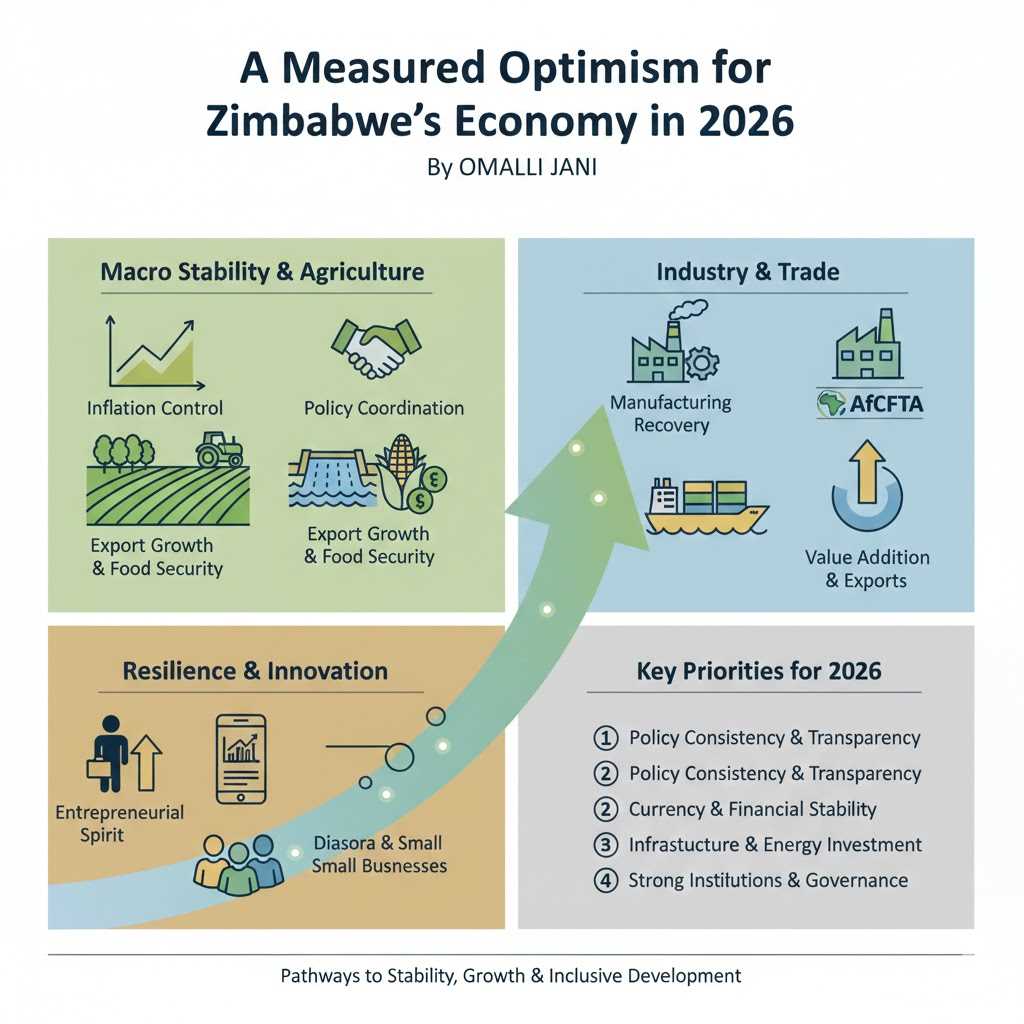
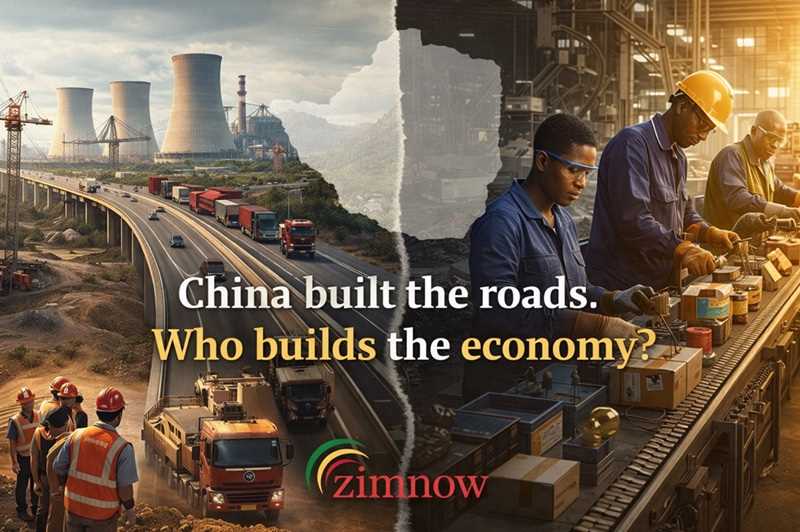


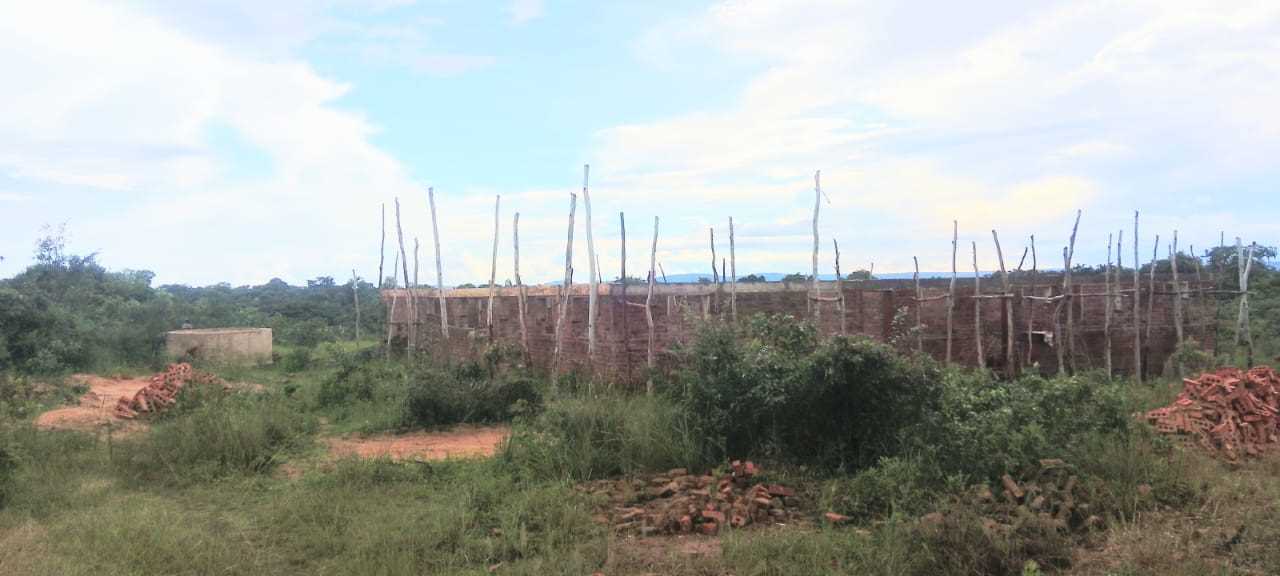

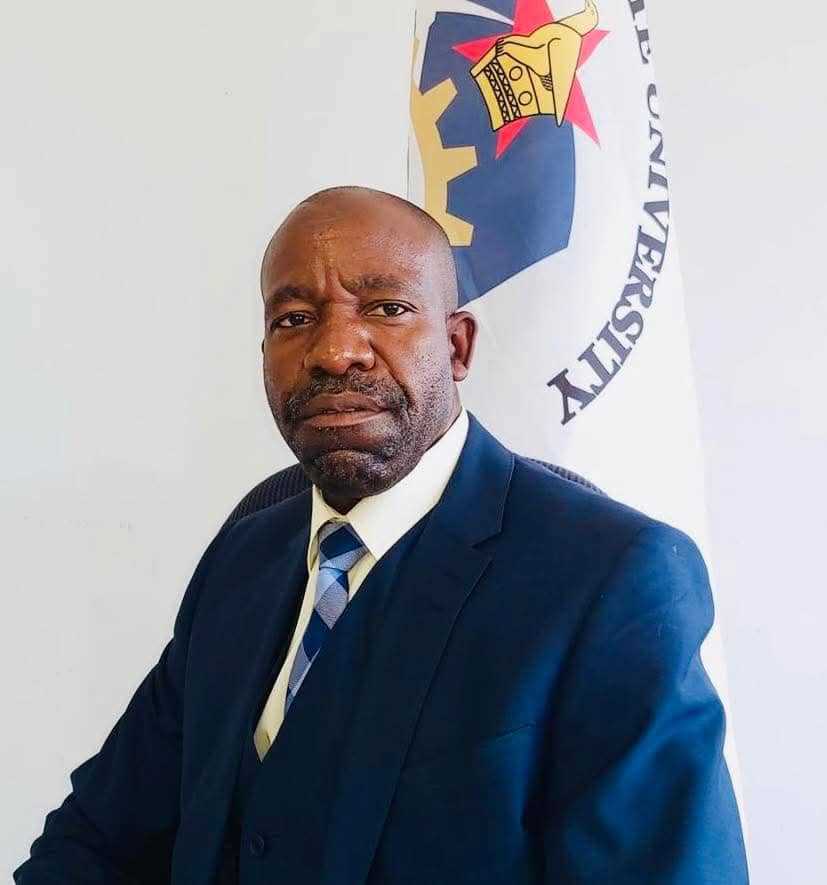


Leave Comments